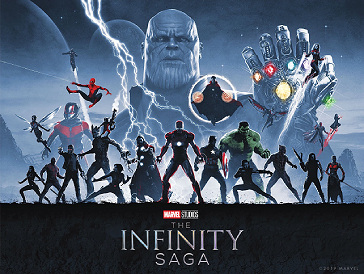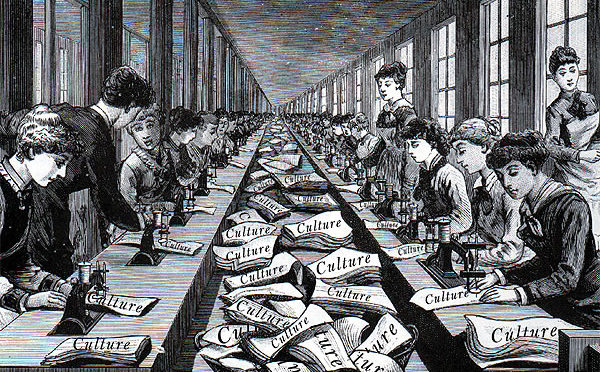In this blog, weŌĆÖll dive into the concept of the Culture Industry, a term introduced by critical theorists Theodor W. Adorno and Max Horkheimer in the 1940s. This idea comes from Theodor W. Adorno and Max Horkheimer, two critical theorists who were part of the Frankfurt School. They used “culture industry” to describe how art, media, and entertainmentŌĆöthings we usually think of as creative and expressiveŌĆöare turned into products for mass consumption.
What is the Culture Industry?
So, what exactly is the culture industry? ItŌĆÖs how music, movies, TV shows and even news are packaged and sold to us. Adorno and Horkheimer saw this coming in the early 20th century, but itŌĆÖs even more true today. Think about it ŌĆō everything feels a bit formulaic, from the blockbuster movies that come out every summer to the hits on Spotify. ThatŌĆÖs because it is.
The cultural industry has turned something that was once unique and personal, like a painting or music, into something mass-produced. Art is no longer about creativity but about what can be sold. What is the purpose? To make money, of course.
1. Marvel Cinematic Universe


2. Formulaic creation of popular music
The modern pop music industry is also strongly influenced by the cultural industry. The creation of pop music increasingly relies on data analysis and market research to design music that can impress the public rather than the individual creativity of artists. In 2019, the creation of seven of the top ten songs on the Billboard 100 chart involved the same group of behind-the-scenes producers and lyricists. These production teams create songs that can attract the most listeners by calculating the patterns and trends of pop music. This model of music production shows that pop music is becoming more and more formulaic, and the songs that listeners hear often follow similar rhythms, melodies, and lyric structures. This model not only limits the creative freedom of artists but also leads to a decline in the diversity and innovation of musical works.
But Adorno and Horkheimer go further. They argue that the culture industry is not just about making money, it is about distracting and controlling us.
How Does It Culture Us?
You might be wondering, ŌĆ£How does entertainment control me? I just watch Netflix to relax!ŌĆØ Well, thatŌĆÖs precisely the point. The culture industry keeps us comfortable and entertained, so weŌĆÖre not paying attention to more significant issues around us. We get so caught up in the next episode of our favourite show or the latest celebrity drama that we forget to question things like inequality, corruption, or even our dissatisfaction.
Adorno and Horkheimer saw this as a form of manipulation. The media, music, and movies we consume donŌĆÖt just reflect cultureŌĆöthey shape it. The culture industry feeds us content that reinforces specific ideas about whatŌĆÖs ŌĆ£normalŌĆØ or desirable, whether itŌĆÖs the perfect life we see on Instagram or how romance is portrayed in rom-coms. Over time, this makes us passive consumers instead of active thinkers.
The Culture Industry Today
The culture industry isnŌĆÖt just something from the 1940s. If anything, itŌĆÖs even more relevant now. TodayŌĆÖs media landscape is all about keeping us hookedŌĆöwhether itŌĆÖs Netflix auto-playing the next episode or YouTube suggesting another video. The culture industry in the digital age works overtime, ensuring weŌĆÖre always consuming something, whether itŌĆÖs social media, streaming services, or 24-hour news cycles.
Think about reality TV. Shows like Love Island or The Bachelor keep viewers glued to the drama. These shows create a version of reality thatŌĆÖs not real but entertaining enough to keep us coming back. And while weŌĆÖre busy watching, weŌĆÖre not overthinking about the bigger pictureŌĆölike how these shows might reinforce stereotypes or promote superficial values.

The reality TV show Love Island is one of the most popular shows in the UK and worldwide. Such shows attract a large number of viewers by creating dramatic emotional conflicts and social interactions. In 2019, Love Island became the most watched show on the British ITV2 channel. Although the show claims to show “real life”, many plots are carefully manipulated through scripting and editing techniques to stimulate the audience’s emotions and participation. The show has influenced young viewers’ views on interpersonal relationships and self-image through dramatic plots and idealized appearance standards. Many viewers have gradually accepted the appearance standards in the show, leading to increased demand for cosmetic surgery and the resulting self-perception problems.
So, why should we care about the culture industry? Understanding how entertainment shapes our thoughts and behaviours helps us see that weŌĆÖre not just passive consumers. When we realize that much of what we watch, listen to, and read is designed to keep us entertained, distracted, and even controlled, we can start to make more conscious choices about the media we engage with.
ItŌĆÖs not about rejecting all entertainmentŌĆöitŌĆÖs about being aware of how it influences us. The culture industry turns creativity into a commodity, but that doesnŌĆÖt mean we canŌĆÖt seek art and media that challenge us, make us think, and inspire us to be more than just consumers.
Reference List:
- Box Office Mojo, the Marvel Cinematic Universe (MCU), is the highest-grossing film franchise, with global box office earnings of over $28 billion as of 2024.
- Billboard and Rolling Stone, many of the top pop songs on the Billboard Hot 100, involve the same small group of producers.
- NPRŌĆÖs feature on “The Anatomy of a Pop Hit.”
- The Guardian regularly covers the impact of reality TV shows like Love Island on young audiences, including the societal influence on body image and romantic relationships. Articles like “The Dark Side of Love Island” (2019)


You write a very well-summarized account of the culture industry with relevant examples. Marvel and reality TV are great examples that emphasize the standardization of mass consumption. One thing I would suggest would be to discuss media that audiences actively engage with. You mention passive consumption, but I wonder how you would incorporate counterarguments to this theory where critical and interactive use of media might exist alongside what Adorno and Horkheimer have to say.